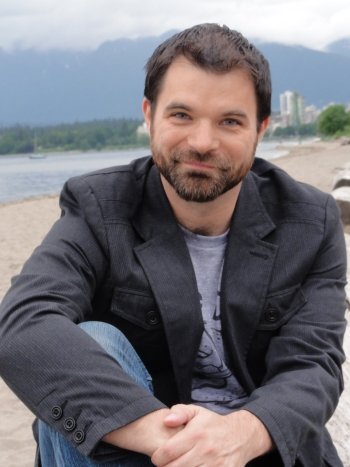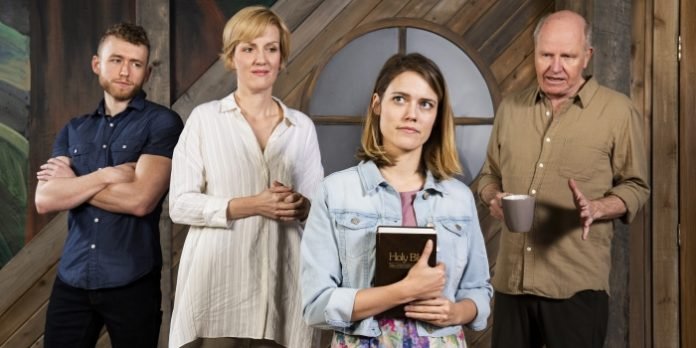In the world premiere of BC playwright Peter Boychuck’s dramedy Jesus Freak, the dysfunctional family genre is turned on its head as daughter Clara comes home from college and announces to her left-leaning family she’s become a Christian.
In this Q&A with the playwright, we find out more about the play, its inspiration, and how it made its way to the Pacific Theatre stage.
This interview has been edited.
Tell us about Jesus Freak. What is about?
It’s family drama/comedy about the Campbells, who are a fairly typical B.C. family. The dad is a Leftie activist turned bureaucrat, the mother writes mystery novels, their son is a struggling actor in Vancouver who just broke up with his long-time boyfriend, and their daughter, Clara, is going to grad school at McGill. The play takes place on Easter weekend at their cottage in the Gulf Island. Clara comes home and announces that she’s discovered religion, which is an anathema to the rest of the family. The play takes places over two days as the family tries to deal with Clara ‘leaving the tribe’.
What was the inspiration for the play?
Most of my friends are like me, over-educated secular liberals. One of them, who had just become a parent, joked that their deepest fear was their child becoming a fundamentalist Christian, and I remember thinking it was an interesting idea for a play; a reversal of the
familiar story of the ‘lost sheep’ who breaks away from the religious family.
Is it based in personal experience or is it allegorical? Or perhaps, both?
My parents were married in a basement, much to my devout grandmother’s chagrin, and they substituted passages from the Bible with excerpts from The Prophet by Kahlil Gibran.
They exposed us kids to religion but it didn’t really take. My sister is gay so I have a lot of issues with the treatment of homosexuals at the hands of religious institutions. However, at various times in my life, I have found myself both drawn to and repulsed by religion. My best friend in high school was deeply devout (he ended up attending Trinity Western for a
while, before turning his back on the faith) and we would have these long debates about spirituality and institutionalized religion.
I always find myself drawn to topics where I myself am deeply conflicted, and wanted to explore religion in a play for a long time.
You wrote the play with Pacific Theatre in mind. What was it about the subject matter that had you thinking of the company?
I have always admired Pacific Theatre. My first exposure to their work was Prodigal Son by Shawn Macdonald, who is the dramaturge for Jesus Freak, which is about a young gay man struggling to reconcile his Catholic faith with his sexuality. When I started writing Jesus Freak, I was working as a dramaturge on Common Grace by Shauna Johannesen, and it just felt like a natural place to stage the play. They are also committed to staging new work, which I appreciate.
Family dramas are a mainstay of theatre. What does Jesus Freak bring to the genre?
I think theatre tends to focus on dysfunctional families for obvious reasons – there’s more conflict – whereas I grew up in a very close family where we’re all very affectionate with each other. I wanted to represent that onstage. I also thought depicting the Campbells as
tender and close-knit actually ups the dramatic stakes for Clara. By revealing her new belief system, she risks losing something precious.
Pacific Theatre is known as a “faith based” theatre company. What’s in it for audiences who are not religious?
To be perfectly honest, I think this play is more for a secular audience, so it will be interesting to see how it goes over on their stage. I try very hard to be even-handed whenever I write plays, so I hope all viewpoints are given equal weight, but I did write the play from the perspective of someone who is not religious, so there should be plenty there for a non-religious person to enjoy.

Like one of your other plays, Shelter From The Storm, it sounds very West Coast based. What is it about the West Coast “lifestyle” that intrigues you so much?
I guess probably in the same way Michel Tremblay wrote about the Plateau in Montreal, I like to dramatize what I know.
I have written plays set in other places – a couple years ago I had a comedy about the Tim Hortons in Afghanistan that premiered at Lunchbox Theatre in Calgary, and my first produced play was set in Montreal – they’ve just been produced in other cities. But you’re right that this play definitely shares DNA with Shelter from the Storm. It’s even set outdoors on a porch!
As the playwright, are you in the rehearsal room for the production? If so, what is your role and what is it like as a playwright to see your characters come to life?
My wife and I just had a baby, and I work as a writer in the video game industry, so I won’t be able to in the rehearsal room as much as I’d like, but generally on a production I’m mostly there to fix any last problems with the script and be a resource for the creative team in case they have questions about character, need clarification on plot or themes. I tweak lines, that sort of thing.
What do you hope an audience walks away talking about after seeing Jesus Freak?
In the end, the play is essentially a cry for tolerance. I have become concerned that we are becoming increasingly divisive and unwilling to engage civilly with people who don’t share our beliefs, which saddens me.
One of the things I have enjoyed about becoming a parent is meeting other parents who come from different backgrounds and walk of life. It enriches me, and makes me more whole.
Jesus Freak play Pacific Theatre (1440 W 12th Ave, Vancouver) March 1-23. Visit pacifictheatre.org for tickets and information.

